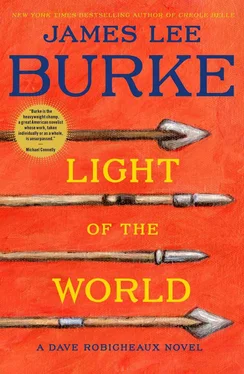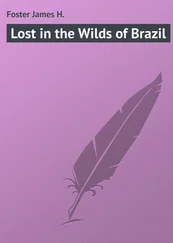“Here’s the note that came with it,” Gretchen said. “It’s a Xerox. You can bet it and the photo and the envelope are clean.”
Regardless, I held the sheet of paper by the edges. The note was typed, unlike the one sent by Surrette to Alafair after she interviewed him in prison. If the sender was Surrette, he was a smart man. There was no way to compare the notes. Even the dashes between the sentences had been replaced with conventional punctuation. It read:
Dear Munchkin,
I have already started casting our film. I think this lady is perfect for the role of “the sacrificial queen,” don’t you? We can add others as we go. You have no idea how many “volunteers” are out there and how easily recruited they can be. Please bring your equipment to our first meeting and we’ll get started immediately. We’ll have some cherry pie.
Sincerely,
Your biggest fan,
A.
“This has to go to the sheriff and the FBI,” I said.
“That’s what he wants me to do,” she replied.
“How do you figure that?”
“Because Surrette will disappear and I’ll look like an idiot. In the meantime, we’ll go crazy thinking about what he’s doing to that girl.”
“I’ll go with you to the federal building in Missoula.”
“You can take the note and the photograph, Dave, and do whatever you want with them.”
She unhitched the chain on the gate and started through it.
“You’re the beloved daughter of my oldest and best friend, Miss Gretchen,” I said. “Do you believe I would deliberately hurt either of you? Do you honestly believe that?”
She rechained the gate and didn’t look back. I might as well have been speaking to the wind.
On Wednesday, Wyatt Dixon was building a sweat lodge in his side yard with stones from the river, hauling them bare-chested uphill in a wheelbarrow, when he saw a chauffeured black Chrysler pull off the highway and park by the entrance to the steel footbridge on the opposite bank. Love Younger got out of the backseat and began walking across the bridge, his rubber-booted feet clanging on the grid, a straw creel hung from one shoulder, a split-bamboo fly rod in his right hand, a cork sun helmet on his head.
He stepped off the bridge and walked down to the water’s edge, where Wyatt was lifting a large stone into the wheelbarrow. “You mind if I fish along the front of your property?” he asked.
“Montana law allows you to go through anybody’s land, long as you’re within the flood line of the river,” Wyatt said.
“I heard there’s a deep hole under the bridge here. They say it’s full of German browns.”
“Have at it,” Wyatt said. He sat high up on the bank, a long-stemmed weed between his teeth, his straw hat slanted down on his forehead, and watched the older man wade into the water and thread his nylon leader through the eyelet of a woolly worm. What’s really on your mind, old man? he thought.
Wyatt could not reconcile the proportions of the older man with his wealth and status. Love Younger had the neck of a bull and the hands of a bricklayer. The few rich people Wyatt had known did not resemble Love Younger. Did Younger come up the hard way, racking pipe and wrestling a drill bit in the oil field? Or had someone bequeathed him money, a rich wife, maybe? Wyatt did not believe that great wealth came to people through hard work. If that were true, almost everyone would be rich.
He got to his feet. “You won’t catch none like that,” he said.
“Oh?” Younger said, turning around in the water, the current cutting across his knees.
“You have to face the opposite bank and throw the woolly worm at eleven o’clock from you. Then you let your line billow out in a big bell. As your worm sinks, it’ll swing past you and straighten the line. That’s when the hackle on your worm will start pulsing. By that time the line will be at two o’clock and the worm will be drifting right above the bottom. Them browns will flat tear it up. The best time is in the fall, when they spawn. They’ll knock the rod plumb out of your hand.”
Wyatt knew Younger was not listening, and he wondered why he was going to such lengths to explain a fishing technique to a man who probably cared little or nothing about it.
“I see you’re an expert,” Younger said, wading out of the stream. “Can I sit down?”
“Suit yourself.”
“I’d like to buy that acreage you have behind Albert Hollister’s place.”
“It’s owned by the Nature Conservancy. I lease the grazing rights.”
Younger’s eyes dropped to Wyatt’s shoulders and back. “Where’d you get those scars, boy?”
“On the circuit. Before that, my pap give them out free.”
“He was a harsh disciplinarian?”
“He couldn’t spell the goddamn word.”
Younger opened his straw creel and took out a bottle of dark German beer. “You want one?” he said.
“No, thanks.”
“You look like you’re part Indian. Your profile, I mean.”
“That’s what people tell me. I ain’t.”
“What’d your folks do?”
“Chopped cotton and broke corn. My pap taught me how to put dirt clods in the bag when we weighed in. Sometimes my mother cleaned at a motel on the highway, at least when they was still drilling there’bouts.”
“My father made shine and transported it up to Detroit,” Younger said. “I was fifteen before we had a wood floor. Your pap wasn’t much good, huh?”
“I don’t know what he was. I don’t study on it no more.”
Younger gazed at the mountains that bordered the river and at the cottonwoods that grew along the banks, their boughs swelling in the breeze. “You’ve got yourself a fine place here,” he said.
Wyatt popped a pimple on the top of his shoulder and didn’t reply. He wiped his fingers on his jeans.
“Name your price.”
“I ain’t got one. That’s ’cause it ain’t for sale.”
“You sound like a man who’s at peace.”
“Peace is what you get in the graveyard, Mr. Younger.”
“I get you mad about something?”
Wyatt pulled the weed out of his mouth and flipped it down the bank. “I went up to your place to tell you Bill Pepper was trying to put your granddaughter’s death on me. You had me thrown off the property. Now you cain’t wait to give me a suitcase full of cash.”
“Maybe we have a lot in common, boy.”
“I don’t like nobody calling me that.”
“I had a son like you. He had no fear. He was an aviator.”
“What happened to him?”
“He crashed in a desert and died of thirst. Another son died in a car wreck. I had my daughter lobotomized.”
Wyatt didn’t reply. He could feel the older man’s eyes on the side of his face.
“In ancient times, you would have been a gladiator, Mr. Dixon.”
“I think I’ll stick to rodeoing.”
“It’s been an honor talking to you,” Younger said. He put one hand on Wyatt’s shoulder and got to his feet. His hand felt like sandpaper on Wyatt’s skin. “What became of your folks?”
“I ain’t sure. I got these blank spots in my head. I see people walk in and out of my dreams, like they’re trying to tell me something. These are people I used to know. But I cain’t remember what happened to them or who they are. I get the feeling they’re dead and they don’t like staying under the ground.”
Wyatt stared at the river for a long time and listened to the humming sound the current made through the hollowed-out places under the bank. A cloud had covered the sun, and there was an impenetrable luster on the water’s surface, as though the light that lived in the rocks and the sand on the bottom had died and the world had become a colder and more threatening place. When he looked up, he realized Love Younger had mounted the suspension bridge and was walking toward the opposite side, indifferent to the bridge’s bouncing motion or the rapids below. Wyatt tried to remember what he had said to Love Younger that might have driven him back across the river, but the words were already gone from his memory, along with the images of the people who spoke to him in his dreams and that rarely gave him rest.
Читать дальше












